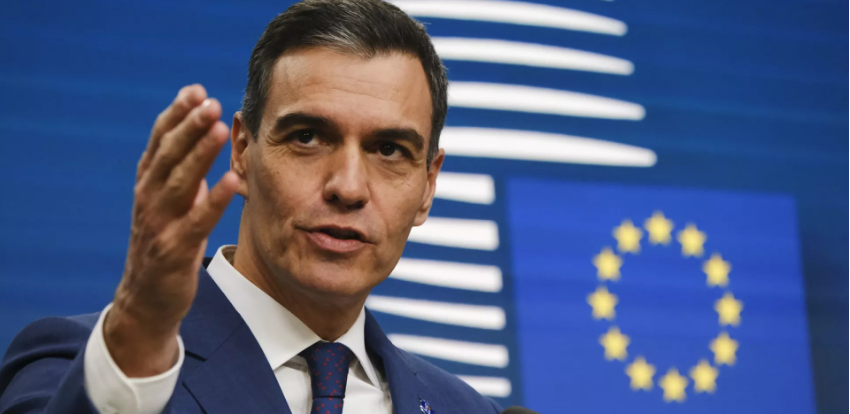“We don’t need another war, in this case, a trade war. We need to build bridges between the EU and China,” Pedro Sánchez said in Shanghai.
Spain’s Pedro Sánchez has openly called on the European Commission and the other 26 member states of the European Union to “reconsider” the proposed import tariffs on China-made electric vehicles, exposing the political cracks ahead of a make-or-break vote that could turn the duties into a fixture for at least five years.
The tariffs are designed to offset the subsidies pumped into the lucrative sector by the Beijing authorities, which lead to artificially low costs. Following a months-long investigation, the Commission found public money spreads across the entire supply chain, putting European competitors at risk of suffering unsustainable economic losses.
As a result, Brussels proposed additional duties, ranging from 7.8% to 35.3%, according to the brand and their level of cooperation with the investigation, that would come on top of the existing 10% rate. The top-up, the thinking goes, would ensure fairer competition in the market.
But for Sánchez, this might not be the best approach – particularly if it triggers retaliatory measures against pork products, a highly valuable and delicate sector for Spain.
“We need to reconsider all of us, not only the member states but also the Commission, our position towards this movement,” the Spanish prime minister said in Shanghai, the last stop of his official four-day visit to China.
“As I said before, we don’t need another war, in this case, a trade war. We need to build bridges between the European Union and China,” he went on.
“And from Spain, what we will do is to be constructive and to try to find a solution, a compromise, between China and the European Commission. If you ask me, I will answer that we’re reconsidering our position.”
The statement represents a significant turn-around for Spain, which often supports the Commission’s line of action. The country reportedly voted in favour of the tariff during a non-binding consultation in July and was expected to maintain that positive position in the upcoming vote, set to take place sometime before November.
The vote is shaping up to be a litmus test of the EU’s willingness to stand up to China’s unfair trade practices, a long-standing point of friction. France and Italy are seen as proponents of the extra tariffs while Hungary is leading the opposition. Germany is under intense pressure from local industry to derail the measure but the ruling coalition has not made up its mind. A qualified majority will be required to stop the duties.
China has been accused of playing a divide-and-conquer strategy to split member states, pit them against each other and thwart collective decisions that would be detrimental to Beijing’s interests. Achieving global leadership in the electric vehicle sector is considered a top priority for the Communist Party, a policy goal that Brussels says fuels the generous financial injections into domestic manufacturing.
The European Commission did not immediately reply to a request for comment.
Sánchez’s words coincide with a meeting between Commission and Chinese officials in Brussels to discuss the anti-subsidy probe and the proposed tariffs.
Pork caught in the crossfire
During his press conference, Sánchez said Spain and China had more topics of agreement than of disagreement and stressed the need to maintain dialogue at the “highest level.” He then acknowledged bilateral relations had to be “re-balanced” over the trade deficit between the EU and China, a concern shared by other countries.
“We don’t want a trade war that would not benefit anybody,” Sánchez told reporters.
The premier repeatedly insisted on his desire to play a “constructive role” between Brussels and Beijing and his hope that a “compromise” would eventually be reached, although he did not specify what form this solution should take.
Asked about the prospect of retaliation against the pork sector, Sánchez said the two issues must not be interlinked. China’s Ministry of Commerce launched in June an “anti-dumping investigation” into imports of “relevant pork and pork by-products” from the EU, just a few days after the Commission unveiled its first proposal of tariffs.
The ministry’s move could pave the way for trade restrictions. Spain, the Netherlands, Denmark, Germany and Belgium are considered the most vulnerable to these reprisals.
“We have expressed our surprise that these commercial negotiations have become entangled with potential sanctions against a sector that has nothing to do with the automotive sector,” Sánchez said about his meeting with President Xi Jinping.
“I think the Chinese population and the Chinese government are very aware of the value of the pork sector,” he added. “The pork sector can have the guarantee that the Spanish government will, of course, defend its interests.”
European exports of brandy are also under Beijing’s scrutiny, with provisional duties put on hold in anticipation of the final EU vote on electric vehicles.

